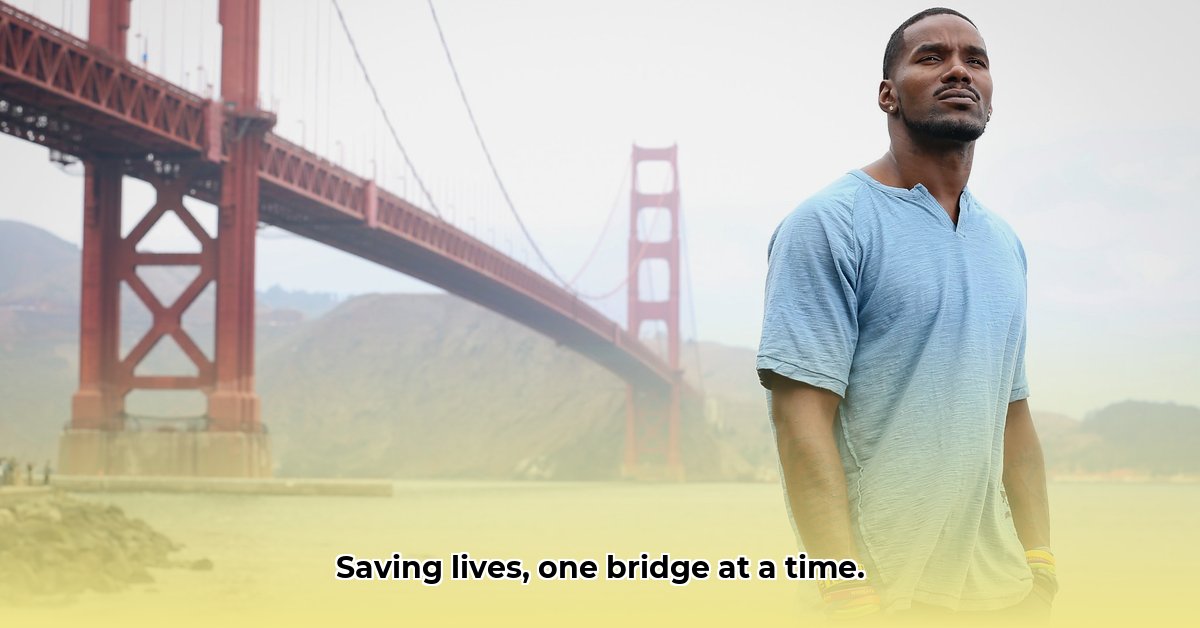
Ninety-Two Minutes of Hope: A Lifeline on the Golden Gate Bridge
Imagine the chilling wind whipping across the Golden Gate Bridge, a stark reflection of the despair in one man's heart as he teeters on the edge, contemplating the ultimate end. Then, a voice cuts through the howling wind – calm, reassuring. It's California Highway Patrol Officer Kevin Briggs, embarking on a 92-minute conversation that would become a testament to the power of human connection. This wasn't just a rescue; it was a bridge built between hopelessness and hope. Briggs didn't merely arrive, assess, and act; he engaged in a marathon of empathy, listening, understanding, and validating the man's pain. How many other lives could be saved through similar acts of compassion?
This wasn't a simple police intervention. It was a profound interaction, a battle for a life waged over nearly an hour and a half. The sheer weight of holding onto someone's existence with words, with presence, is almost unimaginable. The raw emotional toll on Officer Briggs—the sheer responsibility—is a critical, often overlooked, aspect of such interventions. This is underscored by the lasting impact of the rescue, not only on the individual saved but also on the officer himself. It is a powerful reminder of the profound interconnectedness of human lives and the ripple effects of compassion.
A Decade Later: Reunion and Reflection on Resilience
Ten years later, a remarkable reunion transpired: Kevin Briggs and the man he saved were reconnected. Their story ignited a global conversation, revealing not just a feel-good narrative, but a powerful symbol of hope and enduring resilience. This reunion wasn't merely a happy ending; it highlighted the ongoing struggle with mental health, the continuous effort required for recovery. It's a journey, not a destination, emphasizing the absolute necessity of long-term support, consistent care, and a resilient spirit. What lessons can we draw from this enduring story that transcended a single heroic act?
The lasting impact of Officer Briggs' actions highlights the critical need for sustained support and resources for individuals grappling with mental health challenges. Is there sufficient funding for such provisions? What kind of support systems are available to individuals facing suicidal ideation, and are they accessible to all? The reunion between Briggs and the man he saved showcases the continuous necessity of ongoing care, emphasizing that recovery is a gradual process, requiring sustained efforts and understanding.
Lessons from the Bridge: A Call for Compassionate Intervention
Kevin Briggs's heroic act offers invaluable lessons for everyone, from first responders to friends and family. His story shines a light on several key learning points:
Empathy as a Lifeline: Genuine empathy isn't mere sympathy; it's about deeply listening, validating feelings and demonstrating sincere understanding. It's about seeing the person, not simply the crisis. The emphasis here isn't just on reacting to immediate symptoms, but rather on building a true human connection, creating a safe space for the individual to express their distress.
Long-Term Commitment to Care: Successful intervention is not a one-time event. Ongoing support, therapy, and access to resources are crucial for lasting recovery. It's a marathon, not a sprint, requiring sustained commitment from individuals, families, and the broader healthcare system.
Investing in Training and Resources: We urgently need improved training in recognizing and responding to mental health crises for everyone from first responders to community members. Moreover, bolstering funding for mental health services and making them readily available is paramount for saving lives and fostering long-term recovery.
These are not merely abstract concepts; rather, they are critical components of a comprehensive approach to suicide prevention.
Building Bridges to a Brighter Future: Systemic Change for Mental Health
Kevin Briggs' inspiring actions serve as a clarion call for comprehensive change in mental health services. Systemic improvement necessitates collective action on multiple fronts:
Investing in Training: Expand comprehensive crisis intervention training for all first responders and community members.
Expanding Access to Care: Remove financial and accessibility barriers to mental healthcare.
Fighting the Stigma: Promote open discussions about mental illness to create a supportive and understanding environment.
Strengthening Post-Crisis Support: Develop robust systems to ensure continued support and resources after a crisis.
This isn't just about individual interventions; it’s about creating a culture of empathy and providing an extensive safety net for those in need. The transformative potential of Kevin Briggs' actions lies not just in the immediate rescue but in its ability to inspire broader systemic improvements in mental healthcare.
How to Implement Effective Post-Crisis Mental Health Support Programs
Several key factors contribute to the success of post-crisis mental health support programs, including effective collaboration, community engagement, sustainable funding, and ethical data handling. Kevin Briggs' story underscores the critical need for these programs.
A Multi-Sectoral Approach: Collaboration for Impact
Effective post-crisis support requires a multi-sectoral collaboration:
Healthcare Providers: Integrate mental healthcare into primary care, establish clear referral pathways, and invest in training on community-based approaches.
Community Organizations: Actively partner with healthcare providers, offer culturally sensitive services, and advocate for policy changes.
Policy Makers: Fund pilot programs, revise regulations to enhance collaboration, and invest in infrastructure.
Researchers: Evaluate program effectiveness, measure long-term impact, and disseminate findings. This collaborative framework creates a holistic approach, ensuring that support extends beyond initial intervention.
Sustainability and Equity: Overcoming the Challenges
Sustaining these programs requires addressing funding instability and ensuring equitable access, regardless of socio-economic status or cultural background. Addressing these challenges is crucial for building a truly inclusive and effective mental health support system. This requires long-term commitment from all stakeholders.
The story of Kevin Briggs stands as a beacon of hope, reminding us of the transformative power of human connection in the face of despair. His courageous act compels us to create a more compassionate and supportive society, offering a lifeline to those struggling with mental health challenges. The future of mental health support depends on our collective action and commitment to build more bridges of hope and healing.
{No videos found for the given keyword.
}